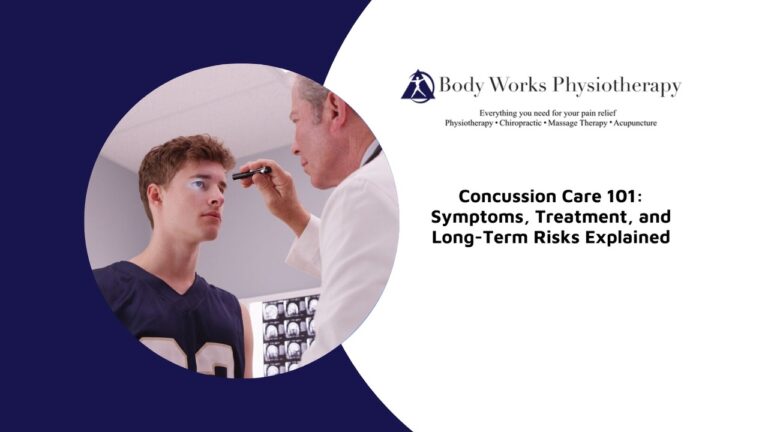
Concussions are a significant health concern that can have lasting effects if not properly managed. They disrupt normal brain function and can lead to a variety of symptoms. In this post, we will explore the common causes and symptoms of concussions, outline treatment strategies, and highlight the best ways to manage and recover from concussions.
Signs You’ve Experienced a Concussion
Concussions are most commonly caused by falls, sports injuries, and motor vehicle accidents. Recognizing the signs of a concussion and seeking professional help is essential. Common signs of a concussion include:
- Headache: Persistent or worsening headache following a head injury. This pain can range from mild to severe and may be accompanied by a feeling of pressure in the head.
- Nausea or Vomiting: Feeling nauseous or vomiting after a head injury. These symptoms can occur immediately or within a few hours of the injury.
- Dizziness or Balance Problems: Difficulty maintaining balance or feeling unsteady on your feet. This can include a sensation of spinning (vertigo) or general unsteadiness.
- Confusion or Disorientation: Feeling confused, disoriented, or having difficulty concentrating. You may find it hard to remember recent events or feel as though you are in a fog.
- Sensitivity to Light or Noise: Increased sensitivity to light or noise, which can exacerbate symptoms. Bright lights and loud sounds may cause discomfort or worsen other symptoms like headache.
- Blurred or Double Vision: Difficulty seeing clearly, experiencing blurred vision, or seeing double. This can affect your ability to read, drive, or perform other tasks that require clear vision.
- Fatigue or Drowsiness: Feeling unusually tired or drowsy. You may find it hard to stay awake during the day or feel excessively fatigued without exertion.
- Tinnitus: Ringing in the ears following a head injury. This persistent noise can be bothersome and affect concentration and hearing.
How Long Does a Concussion Last?
The duration of a concussion can vary widely depending on factors such as the severity of the injury, individual differences in recovery, and adherence to treatment recommendations. While some individuals may recover within a few days to weeks, others may experience symptoms for several months or longer. It’s essential to prioritize rest and follow professional advice to support the recovery process.
Signs You Need Professional Treatment for a Concussion
While most concussions are mild and can be resolved with proper rest and management, it’s essential to be aware of signs that may indicate a more serious injury. Seek professional attention if you experience any of the following:
- Loss of Consciousness for More Than a Few Seconds: Brief loss of consciousness is common in concussions, but if it lasts for more than a few seconds, it could indicate significant brain trauma, potentially involving bleeding or swelling in the brain.
- Severe or Worsening Headache: A severe or progressively worsening headache can signal intracranial bleeding or increased intracranial pressure.
- Persistent Vomiting: Continuous vomiting can indicate a severe brain injury or increased intracranial pressure. Seek professional help if vomiting does not subside, as it could lead to dehydration and further complications.
- Difficulty Waking Up or Staying Awake: Difficulty waking up or an unusual level of drowsiness and lethargy may indicate significant brain injury, including swelling or bleeding.
- Slurred Speech: Slurred or incoherent speech can indicate neurological impairment or damage to areas of the brain responsible for language and motor control.
- Weakness or Numbness in Extremities: Experiencing weakness, numbness, or tingling in the arms or legs can signal nerve damage, spinal cord involvement, or significant brain injury affecting motor functions.
These symptoms may indicate a more severe brain injury requiring urgent medical evaluation and treatment.
Concussion Treatment Explained
Treating a concussion typically involves the following steps:
- Immediate Rest: After sustaining a concussion, it’s essential to rest both physically and mentally. Avoid physical activities, strenuous exercise, and activities that require concentration, such as reading or screen time.
- Monitor Symptoms: Keep track of concussion symptoms and their severity. Common symptoms include headache, dizziness, nausea, confusion, sensitivity to light or noise, and difficulty concentrating.
- Seek Medical Evaluation: If you suspect a concussion, consult a healthcare professional for an evaluation. They can assess the severity of the concussion, provide guidance on managing symptoms, and recommend a plan for recovery.
- Follow Concussion Protocols: Adhere to concussion protocols recommended by your healthcare provider, which may include restrictions on physical activity, guidelines for returning to school or work, and strategies for managing symptoms.
- Gradual Return to Activities: As symptoms improve, gradually reintroduce activities and responsibilities. It’s important to progress slowly and listen to your body, as pushing too hard too soon can delay recovery.
How Healthcare Providers Treat Concussions
The most common treatment for concussions typically involves a combination of physical and cognitive rest, along with close monitoring of symptoms. This approach allows the brain to heal by minimizing activities that could exacerbate symptoms and prolong recovery.
However, healthcare providers can use other strategies to treat concussions and manage symptoms more effectively. These strategies may include:
- Manual Therapy: Relieves neck pain and stiffness with soft tissue massage, joint mobilizations, and stretching exercises.
- Exercise Therapy: Gradually reintroduces physical activity with light aerobic exercises, promoting cardiovascular health and reducing fatigue.
- Cognitive Rehabilitation: Improves memory, attention, and problem-solving through targeted cognitive exercises.
- Education and Lifestyle Modifications: Empowers individuals with knowledge on symptom management, stress reduction, and the importance of sleep and nutrition.
- Return-to-Activity Protocols: Provides a step-by-step approach to safely resume normal activities, minimizing the risk of symptom exacerbation.
Additionally, healthcare providers may recommend symptom management strategies, such as over-the-counter pain relievers for headaches or nausea associated with the concussion.
Treating Concussions at Home: What to Know
In many cases, mild concussions can be safely managed at home under the guidance of a healthcare professional. However, it’s crucial to closely monitor symptoms and follow any specific instructions provided by your healthcare provider.
Rest, both physical and cognitive, is essential during the initial stages of concussion recovery. Ensure plenty of restful sleep, which is vital for brain recovery. Excessive screen time can strain the eyes and brain. Take frequent breaks and use blue light filters on electronic devices.
Ensure that your workstation and living spaces are ergonomically designed to reduce strain on the body and support proper posture. If symptoms worsen or new symptoms develop, seek medical attention promptly.
Your Partner in Concussion Recovery
Concussions can be complex and challenging, but you don’t have to navigate recovery alone. At Body Works Physiotherapy, our Scarborough team is dedicated to providing comprehensive care tailored to your unique needs. From personalized treatment plans to ongoing support, we are here to help you every step of the way.
Let us help you regain clarity and get back to living your life to the fullest. Contact us now to schedule your appointment and start your journey to a healthier, happier you.

